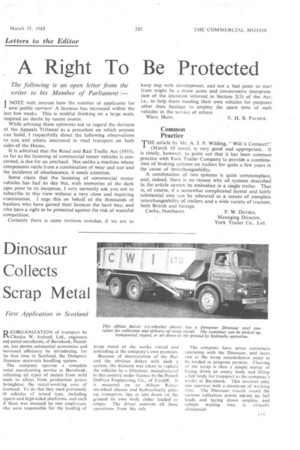A Right To Be Protected
Page 43

If you've noticed an error in this article please click here to report it so we can fix it.
The .following is an open letter from the writer to his Member of Parliament :—
1 NOTE with interest how the number of applicants for new' public carriers' A licences has increased within the last few weeks. This is wishful thinking on a large scale, inspired no doubt by recent events.
'While advising these optimists not to regard the decision of the Appeals Tribunal as a precedent on which anyone can build, I respectfully direct the following observations to you and others interested in road transport on both sides of the Howe.
It is admitted that the Road and Rail Traffic Act (1933), so far as the licensing of commercial motor vehicles is concerned, is due for an overhaul. Not unlike a machine whose components rattle from a combination of wear and tear and the incidence of obsolescence, it needs attention.
Some claim that the licensing of commercial motor vehicles has had its day but, with memories of the dark ages prior to its inception, I very earnestly ask you not to subscribe to this view without a very close and inquiring examination. I. urge this on behalf of the thousands of hauliers who have gained their licences the hard way, and who have a right to be protected against the risk of wasteful competition.
Certainly there is some revision overdue, if we are to
keep step with development, and not a bad point to start from might be a more acute and conservative interpretation of the intention inferred in Section 2(3) of the Act; i.e., to help those needing their own vehicles for purposes other than haulage to employ the spare time of such vehicles in the service of others.
Ware, Herts. E. H. B. PALMER.
Common Practice
THE article by Mr. A. J. P. Wilding, "Will it Connect?" I (March 10 issue), is very good and appropriate. It is timely, however, to point out that it has been common practice with York Trailer Company to provide a combination of braking systems on trailers for quite a few years in the cause of interchangeability.
A combination of two systems is quite commonplace, and, indeed, there is no reason why all systems described in the article cannot be embodied in a single trailer. That is, of course, if a somewhat complicated layout and fairly substantial cost can be tolerated as a means of complete interchangeability of trailers, and a wide variety of tractors, both British and foreign.
Corby, Northants.








































































































